#the great wall of china franz kafka
Explore tagged Tumblr posts
Text
Shoulder to shoulder, a ring of brothers, a current of blood no longer confined within the narrow circulation of one body, but sweetly rolling and yet ever returning throughout the endless leagues of China.
Franz Kafka
#franz kafka#kafka#czech republic#czech author#writer qoutes#the great wall of china#the great wall of china franz kafka#academia#studyblr#university studyblr#literature#czech authors
1 note
·
View note
Text
April/May Update
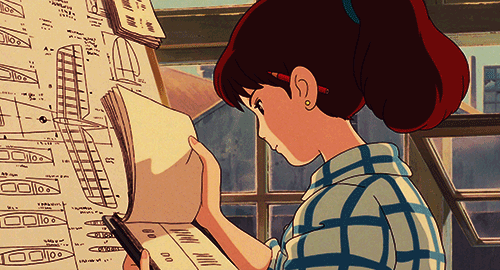
Definitely forgot to update for two months on accident. However, it was because I was locking in so that I can really put pedal to the metal in the second half of 2025! Spent a great deal of time thinking about what I want to go to graduate school for and finally decided, and that's now reflected in my introduction post.
Other than that, it has been pretty quiet, which is what I like in my personal life, especially since right now so much is not quiet at all.
Progress Report
Books Read: 42/100
Nenene by Shizuku Totono The Diary Keepers by Nina Siegal The Unworthy by Agustina Bazterrica Look Back by Tatsuki Fujimoto Phantom Tales of the Night, Vol. 1 by Matsuri O Maidens in Your Savage Season, Vol. 1 by Mari Okada The End of the World is Just the Beginning by Peter Zeihan Goblin Mode by McKayla Coyle The Essence of Being a Muse, Vol.1 by Aya Fumino Firefly Wedding, Vol.1 by Oreco Tachibana The Practice of the Presence of God by Brother Lawrence of the Resurrection The Serviceberry by Robin Wall Kimmerer Metamorphosis by Franz Kafka Daughters of Chivalry by Kelcey Wilson-Lee The Invisible Kingdom by Meghan O'Rourke Sugar Apple Fairy Tale, Vol. 1 by Miri Mikawa Fugitive Telemetry by Martha Wells Nothing to Envy by Barbara Demick How to Blow Up a Pipeline by Andreas Malm A Field Guide to Climate Anxiety by Sarah Jaquette Ray Women Who Run With the Wolves by Clarissa Pinkola Estes 24 Hours in Ancient China by Yijie Zhuang
Words Written 17.5k/50k (definitely have hit some growing pains with the manuscript, if this doesn't show up in June's update, I've shelved it until I have more time to work out the problems)
Magazine article was officially published, and I have added it to my resume.
Signed up for graduate studies workshops related to applying to specific colleges and programs.
Looked into intensive language programs for Russian, to boost language skills quickly. I have decided to focus on Russian since it is the language most important for my graduate studies field.
3 notes
·
View notes
Text
A Country Doctor by Franz Kafka


A Country Doctor A Country Doctor by Franz Kafka is a short story about a doctor who struggles to reach a sick boy on a winter night. Louis H. Leiter writes about A Country Doctor: "A Country Doctor" comments on man, who, buffeted by the scheme of things, is unable to transcend the part assigned him by the absurdity of that existence. Because he does not lack conscious knowledge of his condition, but refuses to act in the face of his portentous freedom, the doctor, an archetype of the anti-existential hero, deserves his fate." Download the book here:

A Country Doctor by Franz Kafka
Franz Kafka's A Country Doctor English Subtitle
Who was Franz Kafka?
Franz Kafka was a German-speaking Bohemian novelist and short-story writer, widely regarded as one of the major figures of 20th-century literature. Born into a middle-class, German-speaking Jewish family in Prague, then part of the Austro-Hungarian Empire, Kafka's unique body of writing—much of which is incomplete and was published posthumously—is considered to be among the most influential in Western literature. His works are characterized by themes of alienation, physical and psychological brutality, characters trapped in an incomprehensible system, and mystical transformations. Kafka's writing blends elements of realism and the fantastic. He often created malevolent, absurd worlds and characters who struggled futilely and had a deep sense of existential angst. Despite the posthumous publication of the majority of his works, Kafka's influence has grown steadily, influencing a vast range of writers, critics, artists, and philosophers during the 20th and 21st centuries. List of Works by Franz Kafka: - Novels: - "The Trial" ("Der Prozess") - "The Castle" ("Das Schloss") - "Amerika" (also known as "The Man Who Disappeared" or "Der Verschollene") - Short Stories: - "The Metamorphosis" ("Die Verwandlung") - "In the Penal Colony" ("In der Strafkolonie") - "A Hunger Artist" ("Ein Hungerkünstler") - "The Judgment" ("Das Urteil") - "A Country Doctor" ("Ein Landarzt") - "The Great Wall of China" ("Beim Bau der Chinesischen Mauer") - "A Report to an Academy" ("Ein Bericht für eine Akademie") - "The Hunter Gracchus" ("Der Jäger Gracchus") - "The Burrow" ("Der Bau") - "Josephine the Singer, or the Mouse Folk" ("Josephine, die Sängerin oder Das Volk der Mäuse") - Letter Collections: - "Letters to Felice" ("Briefe an Felice") - "Letters to Milena" ("Briefe an Milena") - "Letters to Ottla and the Family" ("Briefe an Ottla und die Familie") - Diaries: - "Diaries 1910-1923" ("Tagebücher 1910-1923") This list is not exhaustive, as Kafka wrote numerous other letters, fragments, and shorter pieces. Some of his works were destroyed, either by Kafka himself or by others after his death, so the full extent of his writings is unknown. Read the full article
0 notes
Photo
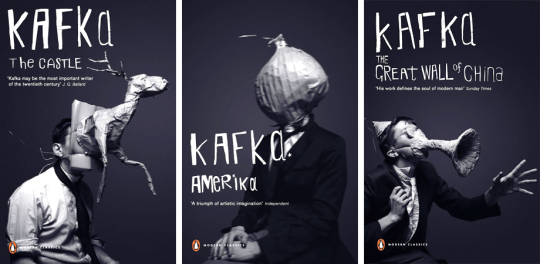
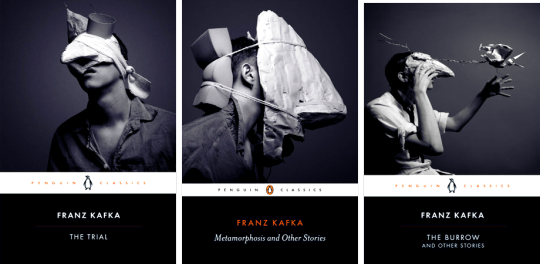
Penguin Random House × Franz Kafka
#Penguin Random House#Franz Kafka#Metamorphosis#Amerika#The Trial#The Castle#The Great Wall of China#The Burrow#booklr#bookedit#litedit#miscedit#matching covers#*
6 notes
·
View notes
Text
"Now the Sirens have a still more terrible weapon than their song, namely their silence. Though it has never happened, it is perhaps conceivable that someone might have escaped from their singing, but from their silence certainly not."
"But they – lovelier than ever – craned and twisted, let their gruesome hair float free in the wind, stretched their claws wide on the rocks; they wanted to allure no more, all they wanted was to catch for as long as possible the reflected radiance from the great eyes of Odysseus."
— Franz Kafka, The Great Wall of China and Other Short Works; from 'The Silence of the Sirens', tr. Malcolm Pasley
7 notes
·
View notes
Text
Today, I’m going to review Metamorphosis by Franz Kafka and two other short stories that are together in my collection.
Metamorphosis is probably the best known narrative of this author and describes the life of a man that was suddenly transformed into a big cockroach. For me, it’s a metaphor of a domestic traumatic experience (that I won’t mention to avoid spoilers) and it puts yourself in someone's shoes: in the skin of the weakest and helpless. Haruki Murakami was inspired by this novella and produced a story about a cockroach that became a man.
The Great Wall of China contains the thought of a Chinese countryman about his complete disconnection with imperial politics. He just doesn't know the Emperor's name or what is going on in palace and couldn’t care less.
A Hunger Artist is a man that performs a risky act as entertainment and endangers his life to call attention. This is very similar to the viral challenges propagated through social networks that cause injuries between people that are looking for likes.
0 notes
Text
Recension av A Hunger Artist and Other Stories av Franz Kafka
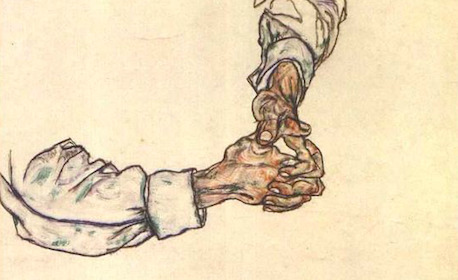
Study of Hands by Egon Schiele, 1913, detail
I've written before about the difficulties of rating short story collections, and it is especially hard to rate those that aren't put together by the author themselves. This one doesn't make me think otherwise. As a matter of fact, it would even be hard trying to rate each of the stories by itself, even without interference from all the rest. The texts come from different time periods of Kafka's writing, are in various stages of being finished, and span a variety of themes, but they often return to the idea of the Artist, especially in stories such as A Hunger Artist and Josefine, the Singer of the Mouse-People. Kafka works with the relationship between Artist and Audience, between creator, consumer, and bystander. It’s interesting, but not as engaging as it could’ve been. There is also a great deal of thought about the nature of living creatures, and about going against it, or succumbing to it. As a matter of fact, a share of the protagonists in these stories are animals; dogs, mice, apes, horses. The surreal is entwined with the mundane, where animals are given human roles and experiences, and inanimate objects seem to have goals, reasons, and a will of their own. Still, the stories are firmly planted in our everyday world. Kafka's writing style is sometimes a blessing, sometimes a downfall. Reflective of his day job, it's often stiff and bleak, and this fits him well. He has this way of being both simple and complex at the same time, wordy, but without being purple. At his best this is absolutely amazing, amplifying the atmosphere in his stories in the way that a blanket of grey haze amplifies the impression and ambience of a rainy day. Oppressive, but in a good way, the prose is definitely present in the text, active, contributing to it just as much as the story does. At his less shining moments, however, the mist turns into a fog and becomes too thick and unyielding, obscuring the text itself, making it very hard to get through.
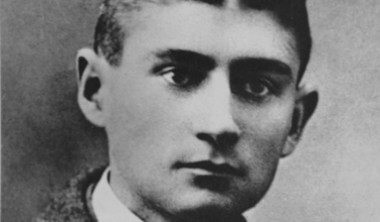
Franz Kafka
Unfortunately, there is a lot of fog in this collection. Many of the stories drag on far more than they'd need to, and I sometimes get the feeling that Kafka gets a bit lost in his own thoughts and loses track of where the text is going. At their worst, the stories lack focus. And no wonder: many of them are fragments of a narrative fused together after Kafka's death, some are writing exercises. A great many were never supposed to be published, but then again, going from that we would've never had many of his best works. But this collection does feel a bit forced in places, a sort of Frankenstein's monster of unfinished short stories and loose scraps. It is definitely geared more towards those reading Kafka for academic reasons, rather than for... well, fun, even though that might not be the first word that comes to mind when reading Kafka. Going through this collection just for the sake of reading left me a bit unsatisfied (even though the brilliant introduction and notes by Ritchie Robertson caught my interest, and worked very well as a companion to the book). While the cover says 'stories' this is, in many ways, a book of fragments. Many of them are very well written as well as interesting, but they seem to be hidden in the fog, and it takes some patience to leaf through the rougher parts to look for those that stand out. Still, there are some amazing stories in there, and when Kafka is at his best, he’s a five star writer. I found myself spending a lot of time writing down sentences, and sometimes entire paragraphs that I just couldn’t get out of my head. The Burrow is fantastic, and so is At the Building of the Great Wall of China, and Blumfeld, an Elderly Bachelor. And it is no surprise that when Kafka gets to play around with the themes of authority, paranoia, and repetition, he shines. I just wish that some of these stories would've been allowed to hold their own, and not be drowned out by all the other ones.
Utgåvan jag läste var översatt till engelska av Joyce Crick och släpptes 2012 av Oxford University Press. Recensionen ligger sedan 2015 ute på mitt Goodreadskonto.
#a hunger artist#a hunger artist and other stories#franz kafka#kafka#book review#bokrecension#literature#litteratur
1 note
·
View note
Text
0 notes
Text
"I was lucky that at twenty years of age, when I passed the final examination of the lowest school, the construction of the wall was just starting. I say lucky because many who earlier had attained the highest limit of education available to them for years had no idea what to do with their knowledge and wandered around uselessly, with the most splendid architectural plans in their heads, and a great many of them just went downhill from there."
- from “The Great Wall of China” by Franz Kafka
2 notes
·
View notes
Photo

#finishedbooks The Great Wall of China by Franz Kafka. This is the only work by Kafka I hadn't read as it is his most minor. Kafka is in my top 5 writers so this was more of instance of delayed gratification more than anything. The Trial and The Castle are just amazing and his short story The Penal Colony is my favorite short story ever written. His brand of absurdity is something I toy with in my short films (especially Stuck) although Beckett probably comes out more. Would actually one day love to adapt The Trial, appreciated how Welles did it, but if you follow the literary descriptions...the locations were much more vague than the distinctive communist-like locations of Welles and would focus on the atmosphere being almost Alice in Wonderland like (very rough idea). Of his two short story collections (other being the famed Metamorphosis) this to reiterate is the lesser, that serves the purpose of giving insight into themes we would see in his greater works. The one short story I particularly enjoyed was Blumfeld: An Elderly Bachelor...who coming home after work contemplates getting a dog and finds two bouncing balls awaiting him in his home who follow him around...
1 note
·
View note
Photo

Investigations of a Dog: And Other Creatures
Franz Kafka
A masterful new translation by Michael Hofmann of some of Kafka's most fantastical and visionary short fiction Animals, strange beasts, bureaucrats, businessmen, and nightmares populate this collection of stories by Franz Kafka. These matchless short works, all unpublished during Kafka’s lifetime, range from the gleeful dialogue between a cat and a mouse in “Little Fable” to the absurd humor of “Investigations of a Dog,” from the elaborate waking nightmare of “Building the Great Wall of China” to the creeping unease of “The Burrow,” where a nameless creature’s labyrinthine hiding place turns into a trap of fear and paranoia.
0 notes
Photo

The Great Wall Facts
- The Great Wall of China is the longest man-made structure in the world.
- During its construction, the Great Wall of China was called “the longest cemetery on earth” because so many people died building it.
- Novelist Franz Kafka (1883-1924) praised the Great Wall as a great feat of human engineering.
https://www.factretriever.com/great-wall-of-china-facts
0 notes
Photo

The Burrow and Other Stories (Penguin Modern Classics)
Franz Kafka
A superb new translation by Michael Hofmann of some of Kafka's most frightening and visionary short fiction Strange beasts, night terrors, absurd bureaucrats and sinister places abound in this collection of stories by Franz Kafka. Some are less than a page long, others more substantial; all were unpublished in his lifetime. These matchless short works range from the gleeful miniature horror 'Little Fable' to the off-kilter humour of 'Investigations of a Dog', and from the elaborate waking nightmare of 'Building the Great Wall of China' to the creeping unease of 'The Burrow', where a nameless creature's labyrinthine hiding place turns into a trap of fear and paranoia.
0 notes